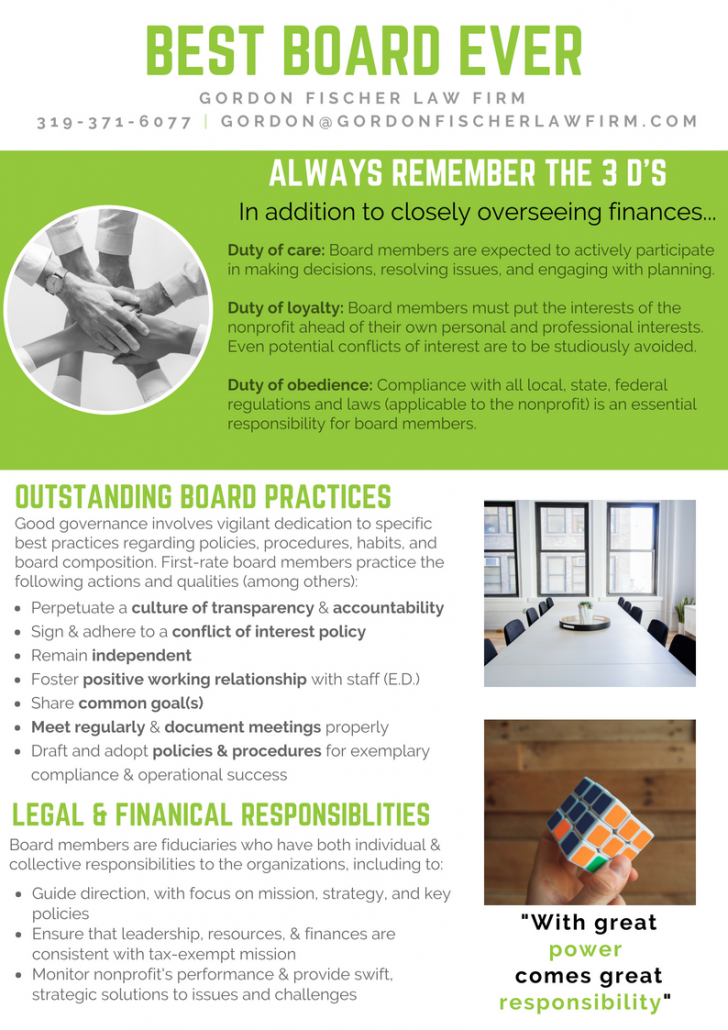Welcome to the newest post in the 25 Days of Giving series. Have questions or a topic related to charitable giving you want covered as a part of the series? Contact me!
You want your favorite charity to be wildly successful. Whether you’re working for the nonprofit as staff, serving on the board of directors, or assisting as a donor or volunteer, you want your nonprofit to have every chance to reach its goals and objectives.
The Internal Revenue Service (IRS) strongly encourages nonprofits to adopt specific governance policies to limit potential abuse, protect against vulnerabilities, and prevent activities that would go beyond permitted nonprofit activities. The IRS also audits nonprofits, just as it audits companies and individuals, and having these policies in place can only help you should you be audited. Finally, and perhaps most importantly, having solid policies and procedures in place will provide a foundation for soliciting, accepting, and facilitating charitable donations.
Each nonprofit is unique, and accordingly policies and procedures needed will vary for each. For instance, a non-operating private foundation will likely need a different set of documents than a public charity. However, most nonprofits will want, at the very least, to consider having the following policies in place.
Articles of Incorporation
Articles of incorporation are necessary to even form a nonprofit corporation; the document is filed with the state and accompanied by a filing fee. This policy can be known by other monikers as “certificate of incorporation,” “articles of organization,” or “charter document.” Think of this as the constitution of the organization. While it can be fairly short, there are some necessary elements in the articles that are required for federal tax-exempt status. Those elements include a statement of purpose, legal address, emphasis on not-for-profit activities, duration, names and address of director(s), and a dissolution clause, among others. You may want to check out the IRS’ sample charter.
Board Roles and Responsibilities
Nonprofit board members are generally tasked with two major responsibilities of support and governance. A board’s rules and responsibilities document should outline the requirements and responsibilities of board members. Some examples of basic components include fundraising participation, determining the organization’s mission and direction, selecting and regularly evaluating the nonprofit director/CEO, and protection of public interest. A policy regarding board roles and responsibilities should encourage nothing short of ethical and legal integrity within board members.

Bylaws
If you’ve ever been part of any board or committee, you’ve definitely heard reference to the bylaws and received a copy upon joining the organization. Nonprofit bylaws serve as the internal operating methods and rules that specify things like the election process of directors, employee roles within the nonprofit, and operational manners of meetings. Specific language in the bylaws is not required by federal tax law, but some states may require nonprofits to have written bylaws to be considered tax-exempt. This document can most often be used to resolve uncertainty between board members and takes the guesswork out of operations.
Code of Ethics
Just as it sounds, a code of ethics document puts in place a set of guiding principles for behavior, decision making, and activities of those involved in the nonprofit, including board members, employees, and volunteers. While principles innate to your organization such as honesty, equity, integrity, and transparency may be understood by all involved, this formal adoption allows those involved to make a formal commitment to ethical actions and decisions. Sometimes this document is known as a “statement of values,” or “code of conduct.” Many organizations post their code on their website to demonstrate accountability and transparency.
Compensation Policy
Competitive compensation is just as important for employees of nonprofits as it is for for-profit employees. Having a set policy in place that objectively establishes salary ranges for positions, updated job descriptions, relevant salary administration, and performance management is used to establish equality and equity in compensation practices. A statement of compensation philosophy and strategy which explains to current and potential employees and board members how compensation supports the organization’s mission can be included in the compensation policy.
Confidentiality
A nonprofit’s board members have a duty of confidentiality due to their fiduciary obligation to the organization. This duty is there regardless of any written policy or not, but it’s certainly a best practice to clarify and explain why and how confidentiality is important to the specific organization. A confidentiality policy can include elements such as the following:
- definitions of what matters are considered confidential
- determination to whom the policy applies
- a statement that board members do not make any public statements to the press without authorization
- a process by which confidential material may be authorized for disclosure

Conflict of Interest
This is arguably one of the more essential policies a nonprofit board should adopt. A conflict of interest policy should do two important things:
- require board members with a conflict (or a potential conflict) to disclose it, and
- exclude individual board members from voting on matters in which there is a conflict.
Note the IRS Form 990 asks whether the nonprofit has such a policy as well as how the organization manages and determines board members who have a conflict of interest. This policy is all too important as conflicts of interest that are not successfully and ethically managed can result in “intermediate sanctions” against both the organization and the individual with the conflicts.
Document Retention
A document retention policy doesn’t mean that EVERY piece of paper and digital report should be kept for a specific duration. But, consider if a document is unknowingly tossed by a nonprofit employee and is later needed in a legal matter. That can cause irrevocable damage. So, ensure all board members, staffers, and volunteers are trained and have a copy of the document retention policy, which should clarify what types of documents should be retained, how they should be filed, and for what duration. This policy should also outline proper deletion/destruction techniques.
Employee Handbook
An employee handbook is another one of the more common nonprofit documents. A quality handbook should clearly communicate employment policies and enforce at-will provisions to all employees. Employment laws are complicated and complex. An employee handbook written/reviewed by a licensed attorney is a good legal step toward avoiding employment disputes. (Yes, just as you need a lawyer to write your estate plan, you’ll need a lawyer to craft/review your employee handbook.) Review your employee handbook regularly, as an out-of-date or poorly written handbook can leave the organization open to employment ambiguity and conflicts.
Financial Policies and Procedures
This document specifically addresses guidelines for making financial decisions, reporting the financial status of the organization, managing funds, and developing financial goals. The financial management policies and procedures should also outline the budgeting process, investment reporting, what accounts may be maintained by the nonprofit, and when scheduled auditing will take place.
Endowment
This resolution concerns funds (and the interest from these funds) that are kept long term. It generally aids the organization’s overall operations. An endowment policy should consider the purpose of the endowment, how the endowment will benefit the mission of the nonprofit, management practices of the endowment, disbursement policies, and investment strategy. (This blog post from GuideStar offers five steps to starting an endowment.)
Gift Acceptance
Gift acceptance is yet another policy the IRS considers to be a best practice for any tax-exempt nonprofit, and the gift acceptance policy can help set acceptance policies for both donors and the board/staffers. There is no federal legal requirement, but this policy does allow you to check “Yes” on Form 990. If well-written and applied across the organization, the policy can help the organization to kindly reject a non-cash gift that can carry extraneous liabilities and obligations the organization is not readily able to manage.

Investments
One way a Board of Directors can fulfill their fiduciary responsibility to the organization is through investing assets to further the nonprofit’s goals. But, before investment vehicles are invested in, the organization should have an investment policy in place to define who is accountable for the investment decisions. The policy should also offer guidance on activities of growing/protecting the investments, earning interest, and maintaining access to cash if necessary. Many organizations hire a professional financial advisor or investment manager to implement investments and offer advice. This person’s role can be accounted for in the investment policy.
Whistleblower
Nonprofits, along with all corporations, are prohibited from retaliating against employees who call out, draw attention to, or “blow the whistle” against employer practices. A whistleblower policy should set a process for complaints to be addressed and include protection for whistleblowers. Ultimately this policy can help insulate your organization from the risk of state and federal law violation and encourage sound, swift responses of investigation and solutions to complaints. Don’t just take it from me, the IRS also considers this an incredibly helpful policy:
“A whistleblower policy encourages staff and volunteers to come forward with credible information on illegal practices or violations of adopted policies of the organization, specifies that the organization will protect the individual from retaliation, and identifies those staff or board members or outside parties to whom such information can be reported. (Instructions to Form 990)”
Policies = Powerful
While these documents may sound like a lot of work, the time and energy you place into ensuring your nonprofit is set up for success will pay off in the long run by saving you legal and IRS fees, internal conflict, violations, and compliance issues. Plus, you can enlist a qualified nonprofit attorney to do the leg work for you!
You may say, “My organization already has a great set of policies in place!” Which is great. But, you should continuously update them as needed/wanted. A policy from 2002 may have been perfect at the time but could be in dire need of updates.
I’d advise making policies the main subject of a board meeting to review what policies have been adopted, which policies need revisions, and which policies you’re missing altogether. If you’re not sure where to start, or how policies should be drafted, read, or enacted, I would be happy to offer you a free one-hour consultation. You can also take me up on my 10 for 990 policy special.
I’m here to assist in drafting or revising your set of nonprofit policies, so don’t hesitate to contact me via email or phone (515-371-6077). We’ll schedule your free one-hour consultation and make a plan to set your organization up for success!
(Note this article is provided for general information only and not intended as legal advice for your specific nonprofit organization. Again, please contact me to discuss your organization’s unique needs.)








